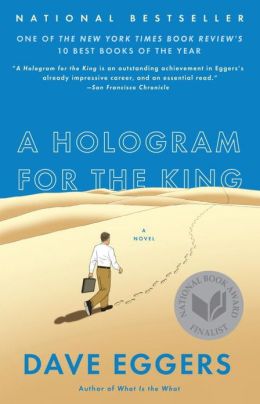Why We Like This Book
Dave Eggers is an author deeply concerned with political, social, and economic issues. He is especially interested in shining a light where injustice can be found. In novels like What is the What, Zeitoun, and The Circle, the author’s point of view can overshadow the narrative. That is not to diminish his excellent prose and important themes…it’s just the way Eggers works. However, A Hologram for the King shows another side of Eggers–a dimension more in line with universal themes of how a man makes sense of his life and whether or not he has made any impact. In characteristic style, Eggers main character, Alan Clay, struggles with identity in a backdrop where global economics play a role. Alan finds himself superfluous in a new world where manufacturing is dead and technology reigns, and he doesn’t know where he fits in.
Discussion Questions
1. In the first few pages, we learn many things about Alan Clay: he lacks the courage to spend more time with a woman he is attracted to; he lacks the money to pay his daughter’s college tuition; he is divorced; his house is on the market but has not yet sold; he owes money to many people. We are told, “he had made a series of foolish decisions in his life. He had not planned well. He had not had courage when he needed it” (4). Is he a sympathetic character and does your response to him change as the novel proceeds?
2. The story of Charlie Fallon’s suicide comes up in the first chapter (5-6), and then intermittently throughout the novel (59-60, 128, 183-84). What does Charlie’s suicide mean to Alan, and why does he keep thinking about it?
3. There is interesting tension between Alan’s former life, in which he was involved in the production of real goods (bicycles) and his situation during the course of Hologram¸ where he is, essentially, selling NOTHING — a mirage, a dream, an image. Is this a commentary on America’s role in the global marketplace?
4. Is it surprising that Alan doesn’t encourage Hanne’s attempts to seduce him? Why does he think that without sex, “life was altogether more streamlined now” (177)? How does he respond to the physical presence of his doctor, Zahra Hakem (153)?
5. Intermittently, Alan is mentally writing a letter to his daughter, Kit. One of the statements that comes to him is, “The key thing is managed awareness of your role in the world and history. Think too much and you know you are nothing. Think just enough and you know you are small, but important to some. That’s the best you can do” (102-03). Discuss the value or limitation of this statement as a maxim for life.
6. “It will be good to be the one to see and shoot the wolf,” Alan thinks (260). How does Alan manage to nearly kill the shepherd boy, and what does he learn about himself in that moment (261-62)?
7. When the benign cyst is removed from Alan’s neck, he feels confused: “If there was no tumor attached to his spine, dragging him to these recent depths, then what was the explanation?” (277). Does the fact that there is nothing physically wrong with him imply that he will now feel better psychologically?
8. Alan tells Zahra a story about a camping trip with his father (304-07). What is the meaning of the story, and how does Zahra react? Does Alan’s romantic visit with Zahra seem to imply a happier time ahead for him, or not?
9. Alan finally does make his presentation to King Abdullah. How does the ending work and what response does it create in you?
(Questions adapted from Random House Academic Resources)
